|
Fladry Line
Fladry is a rope mounted along the top of a fence, from which are suspended strips of fabric or colored flags, that will flap in a breeze. They are intended to deter wolves from crossing the line. Fladry lines have been used for this purpose for several centuries, traditionally for hunting wolves in Eastern Europe. They may be used to protect livestock in small pastures from wolves and coyotes. They are effective temporarily, as the novelty may soon wear off once the line has been crossed, and particularly if the strips are coiled by the wind. The fladry lines can also be electrified, making so-called "turbo fladry". Sometimes this technique is used to alert horses and cattle to the presence of a fence, as the use of smoothwire fences and one strand of electric may not be seen by an animal unfamiliar with such. The use of fladry also has been suggested among techniques to prevent wolves from being attracted to dead stock that may be in conditions that make it difficult for rancher ... [...More Info...] [...Related Items...] OR: [Wikipedia] [Google] [Baidu] |
Fence
A fence is a structure that encloses an area, typically outdoors, and is usually constructed from posts that are connected by boards, wire, rails or net (textile), netting. A fence differs from a wall in not having a solid foundation along its whole length. Alternatives to fencing include a ditch (fortification), ditch (sometimes filled with water, forming a moat). Types By function * Agricultural fencing, to keep livestock in and/or predators out * Blast fence, a safety device that redirects the high energy exhaust from a jet engine * Sound barrier or acoustic fencing, to reduce noise pollution * Crowd control barrier * Privacy fencing, to provide privacy and security * Temporary fencing, to provide safety, security, and to direct movement; wherever temporary access control is required, especially on building and construction sites * Perimeter fencing, to prevent trespassing or theft and/or to keep children and pets from wandering away. * Decorative fencing, to enhan ... [...More Info...] [...Related Items...] OR: [Wikipedia] [Google] [Baidu] |
Wolf
The wolf (''Canis lupus''; : wolves), also known as the grey wolf or gray wolf, is a Canis, canine native to Eurasia and North America. More than thirty subspecies of Canis lupus, subspecies of ''Canis lupus'' have been recognized, including the dog and dingo, though grey wolves, as popularly understood, only comprise Wild type, naturally-occurring wild subspecies. The wolf is the largest wild Neontology, extant member of the family Canidae, and is further distinguished from other ''Canis'' species by its less pointed ears and muzzle, as well as a shorter torso and a longer tail. The wolf is nonetheless related closely enough to smaller ''Canis'' species, such as the coyote and the golden jackal, to produce fertile Canid hybrid, hybrids with them. The wolf's fur is usually mottled white, brown, grey, and black, although subspecies in the arctic region may be nearly all white. Of all members of the genus ''Canis'', the wolf is most Generalist and specialist species, specializ ... [...More Info...] [...Related Items...] OR: [Wikipedia] [Google] [Baidu] |
Livestock
Livestock are the Domestication, domesticated animals that are raised in an Agriculture, agricultural setting to provide labour and produce diversified products for consumption such as meat, Egg as food, eggs, milk, fur, leather, and wool. The term is sometimes used to refer solely to animals which are raised for consumption, and sometimes used to refer solely to farmed ruminants, such as cattle, sheep, and goats. The breeding, maintenance, slaughter and general subjugation of livestock called ''animal husbandry'', is a part of modern agriculture and has been practiced in many cultures since humanity's transition to farming from hunter-gatherer lifestyles. Animal husbandry practices have varied widely across cultures and periods. It continues to play a major economic and cultural role in numerous communities. Livestock farming practices have largely shifted to intensive animal farming. Intensive animal farming increases the yield of the various commercial outputs, but also nega ... [...More Info...] [...Related Items...] OR: [Wikipedia] [Google] [Baidu] |
Soviet Union
The Union of Soviet Socialist Republics. (USSR), commonly known as the Soviet Union, was a List of former transcontinental countries#Since 1700, transcontinental country that spanned much of Eurasia from 1922 until Dissolution of the Soviet Union, it dissolved in 1991. During its existence, it was the list of countries and dependencies by area, largest country by area, extending across Time in Russia, eleven time zones and sharing Geography of the Soviet Union#Borders and neighbors, borders with twelve countries, and the List of countries and dependencies by population, third-most populous country. An overall successor to the Russian Empire, it was nominally organized as a federal union of Republics of the Soviet Union, national republics, the largest and most populous of which was the Russian SFSR. In practice, Government of the Soviet Union, its government and Economy of the Soviet Union, economy were Soviet-type economic planning, highly centralized. As a one-party state go ... [...More Info...] [...Related Items...] OR: [Wikipedia] [Google] [Baidu] |
Vladimir Vysotsky
Vladimir Semyonovich Vysotsky (25 January 193825 July 1980) was a Soviet singer-songwriter, poet, and actor who had an immense and enduring effect on Soviet culture. He became widely known for his unique singing style and for his lyrics, which featured social and political commentary in often-humorous street jargon. He was also a prominent stage- and screen-actor. Though the official Soviet cultural establishment largely ignored his work, he was remarkably popular during his lifetime and has exerted significant influence on many of Russia's musicians and actors. Early life Vysotsky was born on 25 January 1938, at the 3rd Meshchanskaya Street (61/2) maternity hospital in Moscow. His father was Semyon Vladimirovich (Volfovich) Vysotsky, a Jewish man who came originally from Kiev. His mother, Nina Maksimovna Vysotsky (née Seryogina), was Russian, and worked as a German translator. The family lived in a communal flat at No. 126, 1st Meshchanskaya Street. Vladimir's theatrical ... [...More Info...] [...Related Items...] OR: [Wikipedia] [Google] [Baidu] |
Fences
A fence is a barrier enclosing or bordering a field, yard, etc., usually made of posts and wire or wood, used to prevent entrance, to confine, or to mark a boundary. Fence or fences may also refer to: Entertainment Music * Fences (band), an American rock band *Fences (song), a song by Blanche * "Fence", a song from Everything Everywhere All at Once (soundtrack), ''Everything Everywhere All at Once'' (soundtrack) * "Fences", a song on Paramore's 2007 album ''Riot!'' * "Fences", a song by Phoenix from the 2009 album ''Wolfgang Amadeus Phoenix'' Other media * Fence (magazine), ''Fence'' (magazine), an American literary magazine * Fences (play), ''Fences'' (play), a 1987 Pulitzer Prize-winning play by August Wilson ** Fences (film), ''Fences'' (film), a 2016 film adaptation of the play, starring Denzel Washington and Viola Davis, and directed by Washington * Fence (comic book), ''Fence'' (comic book) * Slitherlink or Fences, a logic puzzle published by Nikoli Places * Fence, Wisco ... [...More Info...] [...Related Items...] OR: [Wikipedia] [Google] [Baidu] |
Wolf Hunting
Wolf hunting is the practice of hunting Wolf (other), wolves. Wolves are mainly hunted for sport, for their skins, to protect livestock and, in some rare cases, to protect humans. Wolves have been actively hunted since 8,000 to 10,000 years ago, when they first began to pose a threat to livestock of Neolithic human communities. Historically, the hunting of wolves was a huge capital- and manpower-intensive operation. The threat wolves posed to both livestock and people was considered significant enough to warrant the conscription of whole villages under threat of punishment, despite the disruption of economic activities and reduced taxes. The hunting of gray wolves, while originally actively endorsed in many countries, has become a controversial issue across the globe. Some people see it as cruelty to animals, cruel, unnecessary and based on misconceptions, while proponents argue that it is vital for the Conservation movement, conservation of game herds and as pest co ... [...More Info...] [...Related Items...] OR: [Wikipedia] [Google] [Baidu] |




